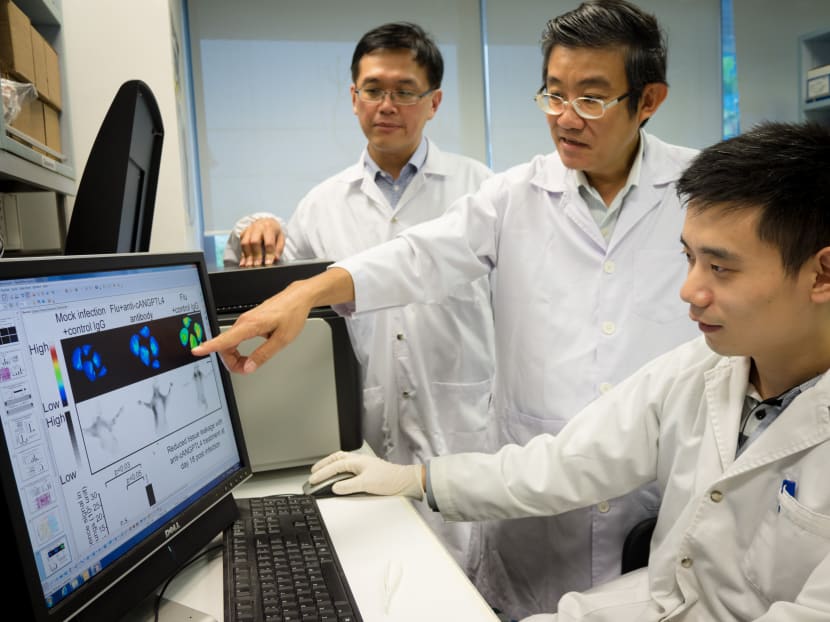Scientists develop antibody to speed up recovery from pneumonia and influenza
SINGAPORE — Scientists here have developed an antibody that could help people with pneumonia and influenza recover faster. It functions by binding with a particular protein and stopping it from working.

From left: NTU Assoc Prof Andrew Tan, NUS Assoc Prof Vincent Chow and NTU researcher Li Liang discussing the effects of the new antibody. Photo: NTU
SINGAPORE — Scientists here have developed an antibody that could help people with pneumonia and influenza recover faster. It functions by binding with a particular protein and stopping it from working.
During an infection, the body triggers an immune response — an inflammation process — to fight the infection. However, often, the inflammation continues after the harmful pathogen is flushed out of the body, causing damage to the lungs and prolonging a patient’s recovery.
The protein, ANGPTL4, which the antibody targets, contributes to the inflammation by causing the blood vessels in the lungs to be leakier, allowing more white blood cells and other antibodies to enter the lungs to combat the infection. By stopping it from working, the “leakiness” of blood vessels is lessened and the inflammation process is reduced.
The antibody, with patent-pending, has proven effective in lab tests but more research is needed to be done before the antibody can be safely tested in humans, said Nanyang Technological University (NTU) in a press release today (Feb 10). The findings were published on Friday in the international peer-reviewed journal Cell Reports.
“When the antibody we developed was given to mice suffering from pneumonia and influenza which had high levels of ANGPTL4, these mice recovered much faster than the other mice who didn’t receive the antibodies,” said Associate Professor Andrew Tan, who led an interdisciplinary team of scientists from NTU’s School of Biological Sciences, Institute of Molecular and Cell Biology, National University of Singapore and doctors from National University Health System, to develop the antibody.
“In our work we have already examined 40 human samples and also in the process of making the antibody suitable for human use. We are now seeking approval to obtain more samples from human patients,” said Assoc Prof Tan. He said it could take up to eight years to develop the antibody into a suitable treatment for human patients.
In the meanwhile, the scientists are also using the antibody to develop a diagnostic kit that can help doctors to track the recovery progress of flu and pneumonia patients. The kit works by detecting the concentration of the protein ANGPTL4.
“We know that the severity of lung damage is associated with higher level of ANGPTL4. Our diagnostic kit will allow doctor to know the efficacy of their treatment. If the treatment works, the level of the ANGPTL4. protein will drop,” said Assoc Prof Tan. The kit should be commercialised in about three years, he said.
Two biotech multi-national corporations, Abcam and Adipogen International, have won the rights to license the antibody. They will produce the antibody for sale to global organisations doing research in vaccine and drug development.
This antibody project took the research team two years to complete, and was jointly funded by NTU, the National Medical Research Council Singapore and the Ministry of Education.
Pneumonia is the second cause of deaths in Singapore at about 18 per cent, just after cancer, and is the leading cause of death in children worldwide accounting for 15 per cent of all deaths for children under 5 years old.






